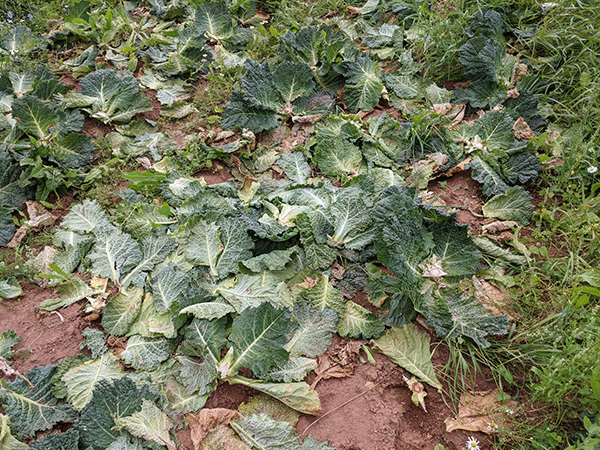British growers have faced one of the toughest years on record as the erratic weather since spring has left them battling a barrage of pests and weeds and causing significant crop losses.
It comes as a new report looked at food waste on farms for the first time since 2011, and found it is a “significant but overlooked hotspot” that has been neglected in comparison to efforts cutting waste in shops and homes.
The report, called Driven to Waste and produced by the WWF and Tesco, found that food waste on farms contributes to 15.3 per cent (around 1.2 billion tonnes) of total food produced.
It concluded that food lost on farms remains neglected as an issue partly because it’s hard to measure, and partly due to an underestimation in the significance of its contribution to food waste levels, while human factors like mismatched supply and demand, and specifications, are behind the problem.
But growers have pointed to a year of erratic weather as one of the main causes of waste, with the 2021 growing season so far including a wet, mild spring, then a period of hot, dry weather interspersed with heavy rain. The unpredictable weather has led to multiple pests, when growers would usually just face one or two, plus vigorous weeds boosted by hot and wet conditions.
Organic veg grower Heather Rhodes said she has lost almost £11,000 worth of broad beans after the sciarid fly pest was spotted in the pods at the point of harvest. The pest lays eggs inside the pods that are not visible until opened and the larvae have hatched, meaning the crop is not able to be sold.
“It turned so quickly, and we pretty much lost everything overnight. We planted in April and checked it every week; you just pray it will make it to harvest,” said Rhodes, member of the South Devon Organic Producers co-operative and supplier to organic veg box company Riverford.

Sciarid fly has been tracked from farms on the east coast of England, towards the west Midlands and Herefordshire growing areas, and has now been affecting farms in Devon, said Riverford’s crop supervisor Riverford, Hannah Croft.
“No green varieties can withstand the pest. We’re looking at purple varieties to see if they fare any better,” she said.
“This year has had everything, with more than one problem. It’s very unusual to get more than one. Growers have just been firefighting to get to harvest.”
Fruit growers have also been hit, with rain affecting the skin finish and shelf life of the British cherry crop, and apples and pears suffering from the fungal disease scab, caused by cool, wet conditions.
As well as pests, weeds like fat hen have shot up, which are particularly bad for crops as they are thirsty plants that compete for water and dry out the soil.
Smaller growers, gardeners and allotmenteers have also suffered, according to head gardener at River Cottage, Adam Crofts, who said market gardeners are “dispirited”.
“It’s been the trickiest year I’ve known growing veg – it was the coldest April and May we’ve had, and then it’s been up and down all of July,” he said.
“There have been loads of pests – everyone has been talking about it. A lot of market gardeners are really dispirited this year.”

Crofts pointed to the fact climate change means weather patterns are only getting more erratic, with traditional growing seasons increasingly “jumbled up”, and unpredictable pest and disease patterns as a result.
But the Driven to Waste report said damage to crops from pests and disease leading to food waste on farms were only “linked to weather, climate and soil”, and said that while some of these factors are beyond control, some could be managed by different varieties and early treatment of pests.
Instead, the report said its research shows food loss on farms is driven by human factors and decisions later on in the supply chain, including specifications and mismatches in ordering and demand.
It also found that despite having higher on-farm mechanisation, plus higher income populations, Europe, North America and industrialised Asia, contribute over half (58 per cent) of farm-based waste. Food waste is a major contributor to greenhouse gases; according to the research, on-farm food waste accounts for four per cent of all global emissions, and 16 per cent of emissions from agriculture.
Box schemes usually have broader specifications for blemishes and size, but there are still restraints to ensure veg fits into the box. Farmers can also cut their own waste by selling out of spec veg in farm shops or their own farm-gate veg stall, or they can send to processing for things like sauerkraut – all of which take additional planning and facilities.













A report sponsered by a corporation is always going to raise suspicions.
Shouldn’t we be distinguishing between lost food and wasted food?
Crops that are lost due to pests, weather and climate change are not waste food, but potentially perfectly good food that has been ruined by the random variables of nature.
Waste food, on the other hand, would be that caused by human effects, eg transportation difficulties ( a lot of food in South America is wasted because of poor road infrastructure and lack of refridgeration), pollinator destruction, wasteful consumers (in the UK and US for example), and strict supermarket demands for cosmetic appearances, of which Tesco’s is probably just as culpable as all the others. Tesco’s is on my boycott list so I’ve no idea if they sell “wonky veg” or not.
One of things we are going to have to realise as we move from the Holocene to the Anthroposcene is that agriculture is going to go away.
https://www.sciencedirect.com/science/article/pii/S0016328719303507
That doesn’t mean food going is going to go away, just industrialised commercial food growing on scale will become impossible outdoors in an unstable climate. Even at a local level it’s not going to be easy.
In the interim I did think t’other day that crop growers might have to look at planting varieties alongside each other, one that is drought resistant and another that is overwater and cold resistant, if such a thing exists for each vegetable and cereal type. Such that some crop is then produced. How practical an idea that is I’ve no idea.
I think Mark makes a good point when he says he avoids Tesco. I try to avoid it too. When we go on holiday sometimes we travel by public transport and are often looking for somewhere to buy fresh food. Its sometimes difficult to find organic food and Tesco and others are all I can find. The plastic in shops like that is also appalling. Its at times like that I am reminded how far Riverford is ahead of the game.
I tend to freeze food to avoid personal food waste.
Excellent and timely report adding to the work of Feedback – especially in relation to unfair contracts and short-term cancellations transferring the risk from retailer to grower and the way market power results in cash crops for export and animal feeds being more profitable than local human consumption. The blurring of any distinction between ‘loss’ and ‘waste’ is very interesting. And I hadn’t realised how much poor animal welfare contributes to food loss/waste. It was also very interesting to see the usual narrative of lack of technology in developing countries leading to food loss while food waste is a post-consumer issue in developing countries challenged, and the larger proportional contribution of developed countries to food waste revealed by this analysis.
Hi Sgl, could you elaborate on how poor animal welfare contributes to food waste?
Hi Jack 🙂
There’s a very interesting case study from the US poultry industry on p.14 of Driven to Waste: ‘How animal welfare issues drive farm-stage food waste’. Mortality levels, from welfare issues such as breeding for fast growth, disease such as avian influenza, accident and equipment failures. Case study quotes 6.5% farm-stage waste, though I’m not sure if transport conditions (injury, suffocation) are included in this. But it does illustrate some of the factors. There must be similar factors affecting fish farming as well as other livestock.